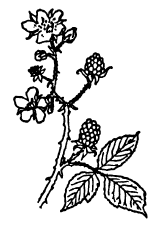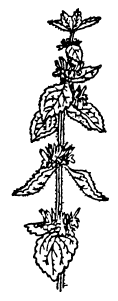Milkweed Ladies (3 page)
Authors: Louise McNeill


T
he summer of 1911 was the summer The
Slashing saved the farm. The Slashing, that tangled mass of dead braches the loggers had left on Captain Jim's up-the-hollow when they skidded away the virgin oak, had begun to let in sunlight that summer and had allowed black raspberries to grow. Even now, seventy-five years later, when I go home, my sister Elizabeth and I will sometimes speak about The Slashing as though it were still a living thing. That winter, the year I was born and the old Captain died, there was no money and no job for G.D., still unable to practice law. G.D. began to write short stories that winter because he thought he might get a little money from them.
He sat late at the kitchen table, writing sea stories and railroad stories, and two eerie ones called “The White Dog” and “The Black Pearl.” Then he typed them up on an old Oliver typewriter he got hold of
and sent them off to the magazines and got them back.
It had been six years since G.D. had touched a drop of whiskey, and he and Mama began talking about him trying for a school job. He would have to take the teachers' examination, and to take it, he would have to go to town. He had no decent shoes and no decent suit of clothes to wear, and so, as he and Mama tried to plan, the new clothes became almost a life and death matter. At last, G.D. talked of selling one of the cows, or of going back to the navy. He kept talking about it, and Mama would cry. But before G.D. could decide, the springtime came, and The Slashing began to leaf out again.
One day when Mama was picking a mess of greens for supper, she saw, spreading across the ruined tangles of the hilltop, some tall white flowers, acres of white flower bushes. When she went to look, she saw that they were black raspberry vines. Mama told that she had never seen such a patch of raspberries, and she would tell it again and again, always, as though The Slashing had been sent by God. The wild birds must have planted the seeds, for usually a slash will come in blackberry vines and fireweed, and the only raspberries on the farm had been a few bushes around the orchard fence.

Black raspberries always sold at a good price, and as the blooms fell off and the green berries began to form, Mama watched and hoped for rain. A good wet season came, and in July, our miracle: the wild harvest. The berries ripened juicy and purple-black, bushels of them; and Mama and G.D. and Granny Fanny, with my older brother and sister helping them, went up into The Slashing and picked and picked. I was only a baby and stayed with Aunt Malindy, and Mama would come home every few hours to let me suck. In the evening, they brought home the great lipping-full buckets and carried them down to Milltown for straight cash.
So G.D. got his shoes and new suit, walked to town, took the teachers' exam and passed it. There was a vacancy in the home school and the trustees decided to give him a chance. G.D. went to teaching that fall of 1911 and taught in one school or another, and later in college, for nearly fifty years.
When G.D. was seventy-four, his college gave him an honorary doctor of laws degree, and just for the hell of it, his young lawyer friend wrote a letter to Charleston and got the old sailor readmitted to the West Virginia bar. These legal proceedings put G.D. into a quizzical frame of mind. A few laugh wrinkles gathered around his eyes
andâas though speaking of the world in generalâhe made one guarded remark: “It's something of an oddity to me.”
In the early years of his teaching, G.D. had some orange handbills printed up and went around the county on another speaking tour. His speech this time was called “The World Through a Porthole,” and he would tell the people about geography, and about Cannibal Tom, and the historic passage his fleet had made through the Magellan Straits. He carried his mementos in his Sea Chest and displayed them in faded one-room schoolhouses all up and down the cricks: the boomerang from Australia; the iridescent mother-of-pearl; Cannibal Tom's eating fork; and the great piece of brown and white tapa cloth from out in the Pacific islands of Polynesia and Samoa. The names called softly in the country schoolhouses: Coral Sea, Pago Pago; and on the wall of our best room in the farmhouse, G.D.'s “diploma” hung in its nice frame, bordered with seahorses, and sea serpents, and starry ocean shapes. G.D. got his “diploma” when he had been initiated into the Holy Order of Neptune as the fleet crossed the equator going south. At night by the fire, if I asked politely, I was allowed to look again at the tapa cloth and Cannibal Tom's fork, and I would study intently the postcard picture of Cannibal Tom, riding a bicycle naked. I had
never seen a bicycle, though I had heard Mama sing about one built for two.
Â
One of my first memories is of Mama in her Japanese kimono, sitting by the wood-stove, singing me a song. The isinglass windows on the stove glow red, and on top of the stove is a shining, silvery decoration like the steeple on a church. Mama is holding me in the warmth of her kimonoâthe only beautiful garment she ownsâa Japanese kimono made of palest green stuff, with white chrysanthemums and pale birds flying through the flowers. Mama's hair is loose around her shoulders and falls down to her waist in a golden-lighted fan. Somehow, she is not at all the Mama I know day by day in the kitchen and barnyard, the work-ridden farm woman in her calico dress, faded sunbonnet, and ugly Sears Roebuck shoes. As we sit there, she is singing to me:
Â
Sweet bunch of daisies brought from the dell,
Kiss me once darling, daisies won't tell
Â

Or the song is sad and low:
Â
Many the hearts that are breaking
If we could read them all;
Many the hearts that are breaking
After the ball.
Â
I remember another song Mama would play on her old “potato bug” mandolin out on the porch in summer, with our new porch swing squeaking back and forth. Sometimes we would get a lemon from town and have lemonade, and Mama would play:
Â
Daisy, Daisy, give me your answer true.
I'm most crazy, all for the love of you.
Â
All day Mama worked over the hot stove in the kitchen or scrubbed clothes on her washboard or milked the cows up at the milk pen. Or she sewed our clothes on her foot-treadle sewing machine, or in the fall, rendered out hot lard and canned the sausage cakes. But I always remember the other Mama, sitting in her pale green kimono or standing out in the meadow with a wild pink rose in her hand. For, besides her tame flowers, her snowballs, bridal wreath, and thousand-leafed rose bush, Mama knew all the flowers of the fields and woodlands: the orange meadow lilies, the purple hepaticas on the rock, the pale dancing Dutchman's britches on The Slashing hill, growing there in the half shade as The Slashing covered its scars and came to woods again.
There was even a sweet-brier rose, the English eglantine of the poets, growing on the wild hillside under Bridger's Gap. It had escaped from some cabin dooryard; and the
horehound had escaped too, and the sweet anise, wandering away from the cabins and running wild on the hills. In later years, when I too wandered away, I would find them and cry out their names in recognition: Sweet William hiding in the grasses of the prairie, blue lupine I found in the sand barrens of Carolina, a pink lady slipper in a Maine forest, tansy by a Massachusetts cellar hole, or sometimes I can still smell, blowing east over Hartford, Connecticut, the scent of cinnamon rose.

The cinnamon rose on the wall of our farmhouse belonged to Granny Fanny, my father's mother, and hers too, the row of bachelor buttons, the pink sweet rockets by the garden fence. But Granny Fanny had little time for fussing around with flowers. She was busy in the kitchen or stable or running the hills with her gunnysack, picking her loads of wild plums or wormy apples, or half-rotten kindling wood.
In 1914, the Austrian archduke had been assassinated at Sarajevo and the world was engulfed in war, but Granny was not of this century; she was wild and running free. Born in 1840, she still roved the rocks and waste places, tended her ash hopper, which made lye for her homemade soap, and poured tallow into her candle molds.
It was as though, standing in her hilly
pocket sometime about 1861 or 1862, she had set her thorn broom handle into the world's axis and brought it to a grinding halt. In her long black dress and black bonnet, she walked the hills of another time, and perhaps, even of another country, and gathered pokes of horehound and “life everlasting” to cure the twentieth century of its “bloody flux.” She was an old pioneer woman, thin and wrinkled as a dried apple, and with her secret in her that she always kept from everyone. On her back, where she had bent it so long under the burdens, a great knot had grown as big as a wooden maul. In her old age, she wore it like a saddle, the seal and saddle of the mountain woman.
When she was no longer needed in the kitchen, Granny Fanny would go into the fields and woodlands with her gunnysack, or she would take her thorn bush broom and sweep the dirt from the floor of the woodshed, then sweep the path and yard so slick and clean that there was hardly a splinter left. Or she would find a dead sheep out in the pasture, pull the wool off it, pick the burrs from the wool, wash it, card it, spin it, and knit it into crooked mittens and socks. But she would never sew or do fine quilting or mend the clothes. If clothes wore out, she threw them in the fire.
Granny Fanny was not at all a proper
woman like my other grandma, my mother's mother, Grandma Susan, who worked only at housework and wove coverlets and always spoke so nice and fine. Granny Fanny would sometimes have a high fit of temper, pack up her black “gretchel,” and go whipping over the hill to Aunt Mat's. She was high tempered, tight-lipped, even, in a sense, an unlovable woman, and yet I loved her with a wild, fierce kind of love and would always fly to her defense. But Granny Fanny had her own sharp tongue, her black “gretchel,” and her secret. When I was a child, I could feel that secret in her, and I wanted to know. I wanted to know so much that sometimes, when she tried to sing, I would look at her hard and try to see if her secret was hidden down in the song. Granny was not one for singing and had only one tune. She would sing it in her high cracked monotone, always the song about the little horses: